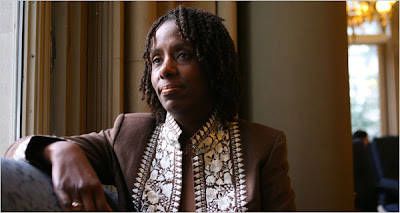
Marcia Lyles, Joel Klein's deputy chancellor for teaching and learning, following on the heels of Diana Lam, Carmen Farina (Lyles took over for Farina when she left Region 8) and Andres Alonso (now chief of the Baltimore school system) gave a revealing interview to Jennifer Medina in today's NY Times (posted at Norm's Notes.)
In the interest of full disclosure, I worked in a 2-day a week F-status job for one of Lyles' top assistants during the 2003-04 school year and have many contacts in Region 8, so I have a bit of an inside view of how the region was run under her tenure, plus some knowledge of how she ran District 16 before the age of BloomKlein. I never met her during all that time but she seems to be a very nice lady and no one had anything bad to say about her, so I won't go there at this time. One of the 4 superintendents chosen in the latest reorganization, about 12% of the schools signed up with her, which put her 2nd to Judy Chin's 27%.
Her story is that she went to public schools in Harlem and spent her entire career as a teacher and supervisor in the NYC schools. Long-time observers of the ed/political scene see her (and her predecessors) as figureheads for the MBA types looking for bottom-line narrow test results who are really driving teaching and learning. Lyles almost admits as much when she says:
"When the music changes, so does the dance.”
“I learned all the new steps,” she said. “I just moved with the changes, that’s what you have to do.”
Medina writes:
While some teachers and principals say the Klein administration desperately needs an educator’s voice in a headquarters packed with lawyers and consultants who have little patience for the city’s education establishment, they question whether Ms. Lyles is aggressive enough to be heard.
But the most revealing part of the interview was her own childhood experiences. As a high school student at the dreadful Benjamin Franklin HS she cut school regularly until an aunt found out.
Convinced that the school was too easy, her aunt, who was raising her, forced her to transfer from Benjamin Franklin High School to Jamaica High School, making an hourlong trip to and from Queens near the end of her sophomore year. There, Ms. Lyles was shocked to learn that after being in the top of her class at Franklin, which was largely black and Hispanic, and finding school so easy that she could skip out, she was struggling to keep up at what was then a largely white Jamaica High.
It was her first lesson in the problem that still preoccupies the nation’s largest school system — the racial achievement gap.
Joel Klein (and Bloomberg) have seized on this issue, trying to play the race card by turning it into a civil rights struggle and calling the inability to close this gap "the shame of this nation."
Ironically, Jamaica HS was recently placed in the list of most dangerous schools. Knowing Chapter Leader James Eterno from ICE, I know that picture is misleading. But what has changed at Jamaica from Lyles' student days? Analyzing how that school is turning into what Benjamin Franklin was would provide some interesting data for Aris and the MBA's at Tweed to crunch.
Lyles, who had found school so easy now had to struggle and ended up flourishing.
“I just thought, wow, what’s the difference?” she recalled of Jamaica High. “What’s going on, now I have to play catch up? That’s when I saw about inequity, that’s when I saw about low expectations.”
There it is. She was just a victim of the low expectations by the teachers at Franklin while she somehow escaped the low expectations of teachers at Jamaica. In other words, racism. Next she'll be telling us that if the teachers at Benjamin Franklin had gotten merit pay things would have been different.
What was the impact of the role Lyles' aunt played?
Did the fact that Lyles had an aunt who acted in a way that made the crucial difference in her life play no role at all? Did the fact that she was now in a better learning environment without being surrounded by other students who were struggling make a bit of a difference? Did the fact that the students at Benjamin Franklin clearly needed so many more resources than the white students at Jamaica - more guidance counsellors, lower class sizes, etc. to make up the racial gap mean anything at all? Does she really agree with people like Chris Cerf and Joel Klein that if they had swapped the entire staffs of Jamaica and Franklin at that time things would have been much different?
If Lyles publicly recognized all these issues, that would be an admission that no matter how many times BloomKlein reorganize, or manipulate test scores, things will not change until there is a will to spend the money needed to make a real difference rather than rely on gimmicks. The refusal of BloomKlein to take any of these factors into account and just close down schools while blaming the teachers is the true shame of their administration.
Marcia Lyles won't go there. She has learned to dance to whatever tune is playing.



























